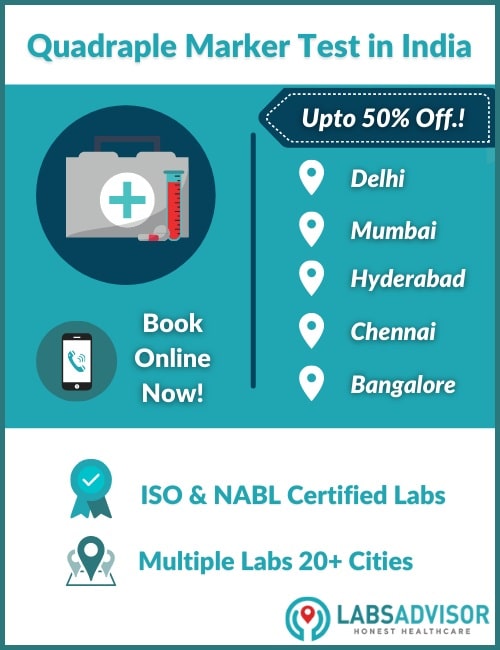
A Quadruple marker test, also known as a Quad screen, is a blood test done in the second trimester of a woman’s pregnancy. Hence, it is also called a second-trimester test. Blood is drawn from the expectant mother to check if there is an increased chance of her carrying a baby with certain genetic disorders.
Book this really important test at your local top-quality labs through us at up to 50% discount. The lowest Quadruple Marker test cost is ₹1800 only.
Quadruple Marker Test Through LabsAdvisor
|
Book your Quadruple Marker test online to avail the exclusive offers and cashback!
Here are the simple steps to book your appointment at a discounted price.
- Click on the link given in the below table according to your preferred city.
- Choose the most suitable lab for your Quadruple Marker test.
- Select your preferred date and time for your appointment.
- Enter the patient details and click submit.
- Congratulations! You have booked an appointment at a discounted price.
Book online yourself at any time of the day or night by clicking on the appropriate link in the table below.
Quadruple Marker Test Cost Near You and Lab Details
We offer the Quadruple Marker test in over 20 Indian cities. Click on the link of your city below to choose a lab and make an online booking for home collection at a suitable time.
| Quadruple Marker Test Cost | Price starting from |
| Quadruple marker test cost in Delhi | ₹1800 |
| Quadruple marker test price in Noida | ₹2025 |
| Quadruple marker test cost in Gurgaon | ₹1800 |
| Quadruple marker test price in Mumbai | ₹2700 |
| Quadruple marker test price in Hyderabad | ₹2000 |
| Quadruple marker test cost in Chennai | ₹2000 |
| Quadruple marker test in price Bangalore | ₹2000 |
| Quadruple marker test cost in Other Cities | ₹1800 |
For more details regarding your booking, you can contact our customer care executives from 9am to 8pm.

Frequently Asked Questions About Quadruple Marker Test
Why is the Quadruple Marker test done?
The Quadruple Marker screens for the following anomalies:
- Neural Tube Defects: These are the birth defects of the spine, brain, and spinal cord. They occur in the first month of the pregnancy often before the woman knows that she is pregnant. The two most common types of Neural tube defects are Spinal Bifida and Anencephaly. In spinal Bifida, the spinal column of the fetus does not close completely. This results in nerve damage which will lead to paralysis of the baby’s legs. In Anencephaly, the brain and the skull do not develop properly. Babies with anencephaly are usually stillborn or die shortly after birth.
- Down’s Syndrome: Down’s syndrome is a genetic condition caused due to chromosomal abnormality. It affects 1 in 700 babies. Children with down’s syndrome have a wide range of learning disabilities and various medical problems like heart disease, lung problems, bowel problems, and sinus. Most people with down’s syndrome need long-term support. There is no cure to the disease although early intervention and support can improve lives significantly.
- Trisomy 18: Also called turner’s syndrome, trisomy 18 is also caused by chromosomal mutation. Most of the babies with trisomy 18 die shortly after birth. Those who survive remain seriously ill and hardly make it to their first birthday.
The science behind the Quadruple Marker test
When a woman gets pregnant, certain substances are released in her blood by the placenta or fetus. By measuring the amount of these substances or markers the risk factor is calculated. The four markers tested in the Quadruple Marker test are:
- Alfa-Feto Protein (AFP) – AFP is a substance produced by the liver of the fetus. The amount of AFP in the blood of a pregnant woman can help see whether the baby may have a neural birth defect. It can also be used to screen for chromosomal defects like down’s syndrome and Trisomy 18. The AFP level also indicates if the baby has a congenital problem in which the intestine sticks out of the belly wall. No AFP is generally found in the blood of a healthy man or a healthy non-pregnant woman. In pregnancy, the level of AFP gradually increases from the 14th week of pregnancy. It continues to rise until a month or two before delivery. AFP values are lower in the case of Asian women as compared to African and white women.
The normal value of AFP is adjusted according to a woman’s age, race, weight, and diabetic condition.
High values of AFP means
- The woman has more than one baby i.e. multiple pregnancies
- The gestational age of the baby is wrong.
- The baby has a neural tube defect.
- The baby’s intestine is out of the belly wall.
- The baby is not alive.
The low value of AFP means
- Gestational age is less than the estimated age.
- The baby has down’s syndrome
An ultrasound is usually done before the Quad test to determine the gestation age and number of pregnancies. This is important to calculate the risk of birth defects.
- Human chorionic Gonadoprotein (HCG) – HCG is a hormone made by the placenta and released in the mother’s blood and urine. The level of HCG rises exponentially after embryo implantation. It is maximum at the 14th week of pregnancy and then decreases gradually. HCG helps in the development of the baby.
The high value of HCG means
- Multiple pregnancies.
- A woman is further along in her pregnancy.
- Molar pregnancy.
Low values can indicate
- The gestational age is less than the estimated age.
- Ectopic pregnancy. It is a pregnancy in which the fetus develops outside the uterus.
- There is a possibility of a miscarriage.
Check the cost of the Beta HCG test in India, here
- Estriol – Estriol is an estrogen produced by the placenta and by the liver of the foetus. Estriol can be found as early as the 9th week of pregnancy. Its level keeps on rising until delivery. An abnormal level of Estriol means that the baby is likely to have chromosomal defects like Down syndrome and Trisomy 18.
- Inhibin A – It is a hormone made by the placenta. A normal result means that the inhibin level is low or negative. If the inhibin A level is high, then the baby has an increased risk of down syndrome.
Check the cost of Inhibin A Test in India, here

Who should undergo the Quadruple Marker test?
All women in their second trimester should undergo the test once. This test is highly recommended for women who
- Have missed the first-trimester screening or dual marker test
- Are 35 or older
- Have a family history of birth defects
- Had viral infection during pregnancy
- Have been exposed to radiation for long periods.
What is the Procedure?
The Quadruple Marker test is usually done between the 15th week and 20th week of pregnancy. The procedure involves drawing out blood from the expectant woman.
- A strap is tightly put around the upper arm.
- A site from where the blood will be drawn is cleaned with cotton dipped in alcohol.
- A needle with a vial attached is injected into the vein and blood is drawn.
- The vial with the blood sample is tightly closed and labeled.
- The site of the injection is pressed and a small bandage is put on it.
- The blood sample is sent to the laboratory for testing.
Risks and Side Effects.
The Quadruple marker test is a simple blood test of the mother so it is not at all harmful for the baby. There are some chances of bruising at the site of needle injection but that heals quickly. If someone has bleeding or clotting problems, she should inform the doctor before the test.
How to interpret the result?
The quadruple test is just a screening test and not a definitive diagnostic test. It only indicates that there is an increased risk of the baby being born with neural defects or birth defects. Many women with abnormal results go on and deliver a healthy baby. The abnormal test should just be used as an indication for further diagnostic testing. These diagnostic test can be:
- High definition ultrasound examination to look for signs of birth defects or abnormalities in the developing baby.
- Amniocentesis – It involves withdrawing a sample of amniotic fluid for genetic and chromosome testing, and can definitively diagnose genetic and chromosomal problems in most fetuses. Amniocentesis carries a small risk of miscarriage.
Other topics you may be interested in;-
- Double Marker Test Cost in India
- ECG Test Cost in India
- EMG Test Price in India
- Echocardiogram Test Cost in India
- Thyroid Scan Cost in India
- NCV Test Cost in India
- Mammography Cost in Bangalore







If you want us to call you back, click on the link below